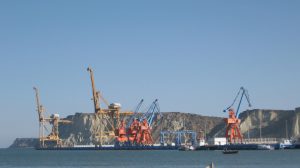Tribespeople in the Kohistan region of northern Pakistan are upset over the levels of compensation they are supposed to receive for their land, which will be flooded to make way for the Dasu Hydropower project (DHP). As a mark of protest they have stopped all survey work on the project, a run of river power plant located on the Indus River, 7 kilometres upstream of Dasu town in Khyber Pakhtunkhwa province. The site is 74 kilometres downstream of the proposed Diamer Basha Dam and 345 kilometres from Islamabad.
Read: Pakistan’s biggest dam stymied by land dispute
The DHP is part of Pakistan’s ambitious Vision 2025 programme as well as its 2013 Power Policy document. Currently the country suffers badly from lack of infrastructure, and access to electricity is a key need. Under the Vision 2025 programme, Pakistan wishes to increase access to electricity from 67% of the population to 90% of the population. The government had campaigned on cutting down load-shedding, or the rolling electricity cuts that affected most of the Pakistani population. While it has made some progress on this front, there is still a long way to go before Pakistan achieves its goals. Vision 2025 is aligned with the Millennium Development Goals and the Sustainable Development Goals, which, in turn, emphasise issues of environment protection and biodiversity. Thus dams like Diamer Basha and Dasu, both located in relatively sparsely populated regions with limited displacement and damage to biodiversity, are a key factor in achieving Pakistan’s goals.
![Map of the location of the project [image courtesy Water and Power Development Authority of Pakistan]](/wp-content/uploads/2016/09/Dasu-project-location-WAPDA.jpg)
The Assistant Commissioner (AC) of Dasu confirmed that the tribes had halted survey work: “The tribes are not allowing survey teams to enter the villages,” he said. “We have start negotiations with them and a few meeting have taken place with the elders. We are hopeful that in coming days we will able to solve the issue.”
The tribesmen, though, were adamant that they would only allow the work to continue if their demands were met.
Complaints of inadequate compensation
Speaking on the condition of anonymity, seven members of the Dasu Dam Action Committee said to thethidpole.net that, “We are ready to sacrifice our land, our houses, the graves of our forefathers and the sources of the livelihood for the sake of the country, but the government must give us enough compensation so that we can settle in new areas. Otherwise, we will not allow the construction of the Dasu Dam.”
Haji Ghulab is 55 years old and the head of a 35 member strong family. He is also a member of the Dasu Dam Action Committee. He said, “The Water and Power Development Authority (WAPDA) has announced compensation of PKR 1 million to 1.4 million (USD 9,536 to USD 13,352) for one kanal of land (about 500 square metres). After the construction of the dam my family will be homeless and without work. I challenge the government that, instead of giving us this amount of money, they should buy us the same amount of land in the nearest cities such as Abbottabad, Masehra or Batgram.”
“If this is not possible, then why does the government want to make us beggars? This is not acceptable for us”, he said angrily.
![Proposed area of the reservoir [image by Shamas Kohistani]](/wp-content/uploads/2016/09/03.jpg)
Haji Ghulam, five years younger than Ghulab, is also a member of the action committee. One of the members of his family, Monan Khan, told the thethirdpole.net, “We have a commercial buildings along the Karakorum High Way (KKH). Two are rented out as hotels and six are rented to shopkeepers. We receive an annual rent of PKR 150,000 (USD 1,430). Our buildings are not evaluated in the compensation we will receive, only the land. How will we be able to build such buildings again on the little we receive?” He suggested that land alongside the KKH should be evaluated at a higher commercial rate.
Other members of the action committee pointed out that the one time payment would be no compensation for the loss of land, and the opportunities that came with it. Allah Yar, at the age of 60, is one of the older members of the committee and he said that half of the population in Dasu does not own land, and their income is completely dependent on what they can gather from their environment.
Risks of default
There is another aspect to the Dasu dam story, and that is the compensation demanded by the government of Khyber Pakhtunwa. The provincial government has demanded that WAPDA pay a 2.5% service charge for land acquisition. Although such a charge is sometimes made on private companies, WAPDA is a central government agencies, and is thus protesting.
Since the funds for the land acquisition are handled by the provincial government, this deadlock has meant that land acquisition has been stalled. Additionally, as the World Bank has provided a USD 590 million loan as well as USD 460 million line of credit for the project, primarily for the acquisition of land. As the dispute drags on, the project is at risk of losing this funding as a review of progress is scheduled for 31 October 2016.
![<p>A jirga of tribal elders in Dasu [Shamas Kohistani]</p>](https://www.thethirdpole.net/content/uploads/2016/09/07-300x225.jpg)



